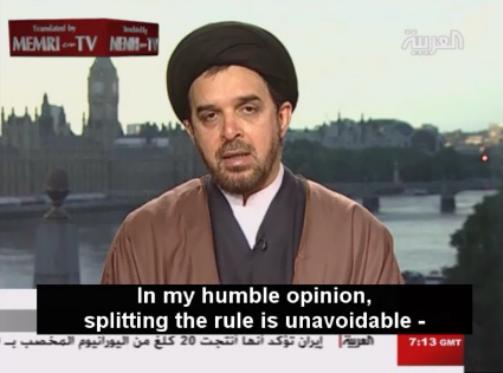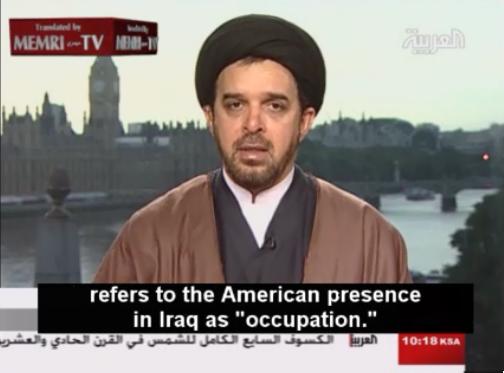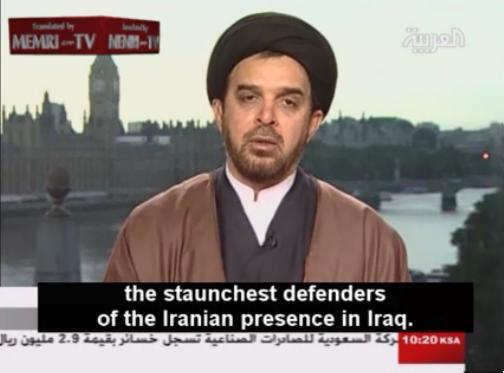 | ||||
|
Following are excerpts from an interview with former Iraqi MP Ayad Jamal Al-Din, which aired on Al-Arabiya TV on July 12, 2010:
- To view this clip on MEMRI TV, visit http://www.memritv.org/clip/en/0/0/0/0/0/0/2549.htm.
- To view the MEMRI TV page for Ayad Jamal Al-Din, visithttp://www.memri.org/subject/en/821.htm.
- To view the MEMRI Democratization and Reform Project page, visithttp://www.memritv.org/subject/en/66.htm; to view the Leading Arab and Muslim Reformists page, visithttp://www.memri.org/content/en/leading_arab_and_muslim_reformists:
"Splitting the Rule Is Unavoidable... In the Interest of Establishing a Government Quickly"


Interviewer: "As of the day after tomorrow, there will be a constitutional vacuum. I'd like to ask about the implications: To what extent will this affect the situation in Iraq, and what are the greatest fears with regard to this vacuum?"
Ayad Jamal Al-Din: "Thank you. In the name of Allah, the Compassionate, the Merciful. I don't think that the constitutional vacuum presents a complicated problem, because the constitution itself has long been violated by those who drew it up. Many articles and laws have been violated throughout these years. Therefore, the Federal Supreme Court has become politicized, and the constitutional experts in this court are capable of finding a way out from this so-called problem.
"The problem in Iraq goes far beyond a constitutional or legal problem. There is an impasse between the two main blocs, the State of Law Coalition and the Iraqi List party, regarding who should fill the position of prime minister. In my view, this problem will not be resolved through negotiations, because there is no dispute regarding the political platform. The dispute is about this or that individual.
"In my humble opinion, splitting the rule is unavoidable – with Dr. Ayad Allawi ruling for two years, and Al-Malaki ruling for two years – in the interest of establishing a government quickly, in order to help the Iraqis in their crisis." [...]
"I Don't Think That Any Iraqi Politician, Myself Included, Refers to the American Presence in Iraq as 'Occupation'"

"I don't think that any Iraqi politician, myself included, refers to the American presence in Iraq as 'occupation.' There is a consensus about the American presence in Iraq, and the only exception is the Sadrist movement. What is in dispute is the Iranian presence in Iraq. Some people hope that the Iraqi list will save Iraq from the Iranian influence. In my opinion, these people are overly optimistic."
"As Soon As They Get Their Hands on Half the Rule... The Leaders of [The Iraqi List] Will Become the Staunchest Defenders of the Iranian Presence in Iraq"

"I draw a parallel between the Iraqi List and the March 14 Coalition in Lebanon. They are exactly alike, with the same supporters and the same approach. In order to understand, Iraqi viewers should go back to the March 14 rhetoric, before Sa'd Al-Hariri became prime minister. Look at how loudly they talked against the Iranian influence in Lebanon. But as soon as he came to power, the Lebanese PM became the staunchest defender of the resistance.
"We see the same thing with the Iraqi List – that Iraqi March 14 Coalition. We hear some of them talking about confronting Iranian influence in Iraq, but I am convinced that as soon as they get their hands on half the rule – and all the more so if they get the rule all for themselves – the leaders of this list will become the staunchest defenders of the Iranian presence in Iraq." [...]
"What Is Important to [America] Is That Iraq is Not a Harmful Country... So the Administration and Congress Can Turn to Confronting Iran"

"In America, they don't want to hear anything about Iraq. They want to withdraw and that's it. They don't want to admit that their plan has failed, because this would have negative domestic consequences, with the November elections drawing near. America cannot find a solution or even deal with finding solutions. What is important [to them] is that Iraq is not a harmful country, and so the administration and Congress can turn to confronting Iran, in order to resolve the problem in the Middle East in a comprehensive way.
"Therefore, whether Biden comes or not, they will have nothing new to offer. They have left the problem entirely up to the rival sides in Iraq, who fight over political positions, and not about the platform according to which the country should be run."





















